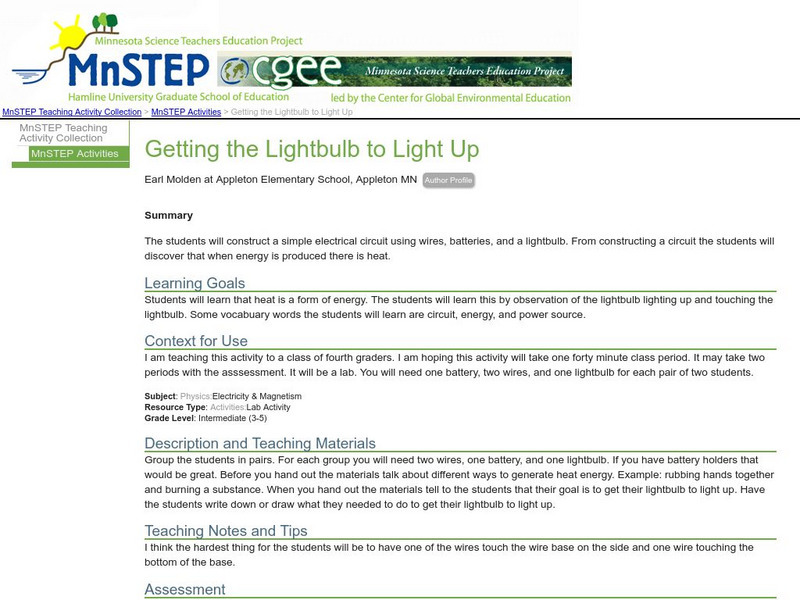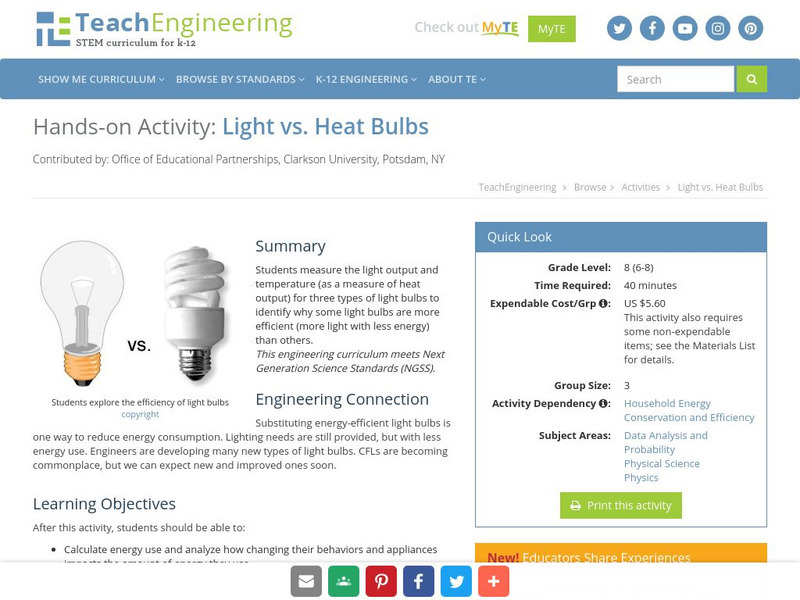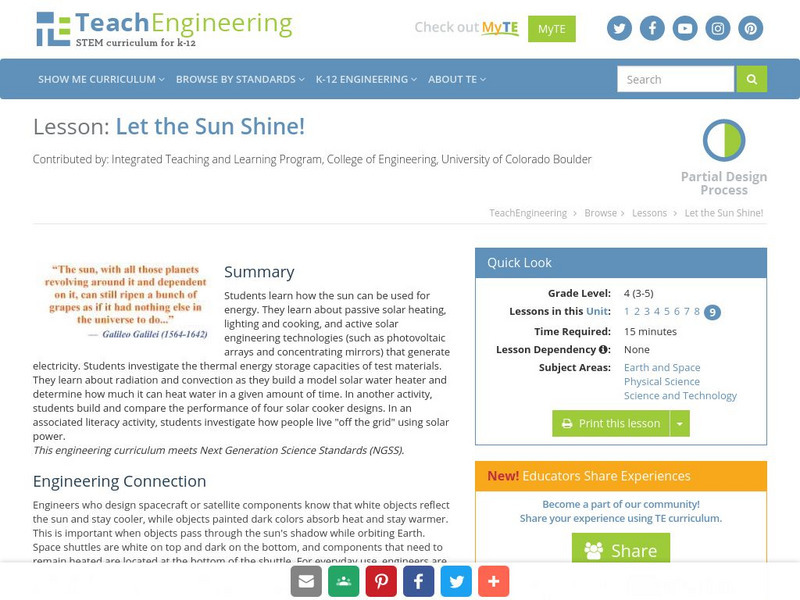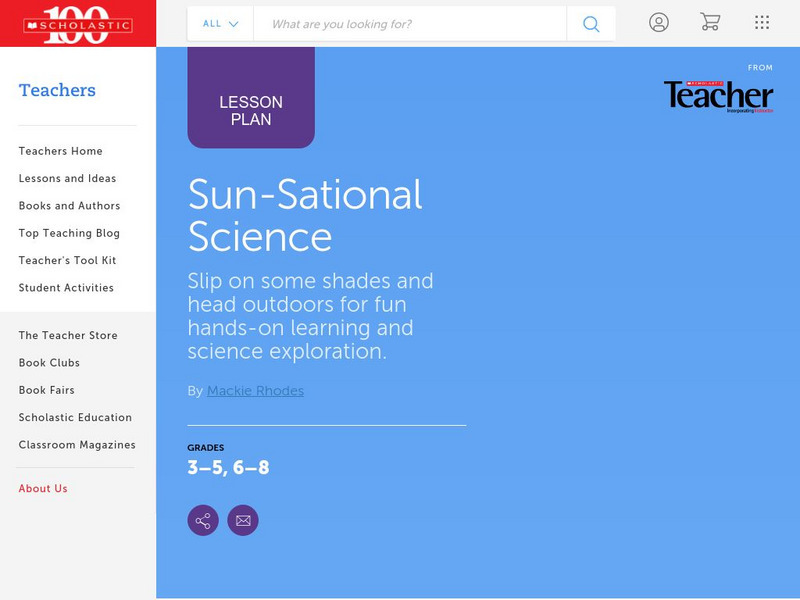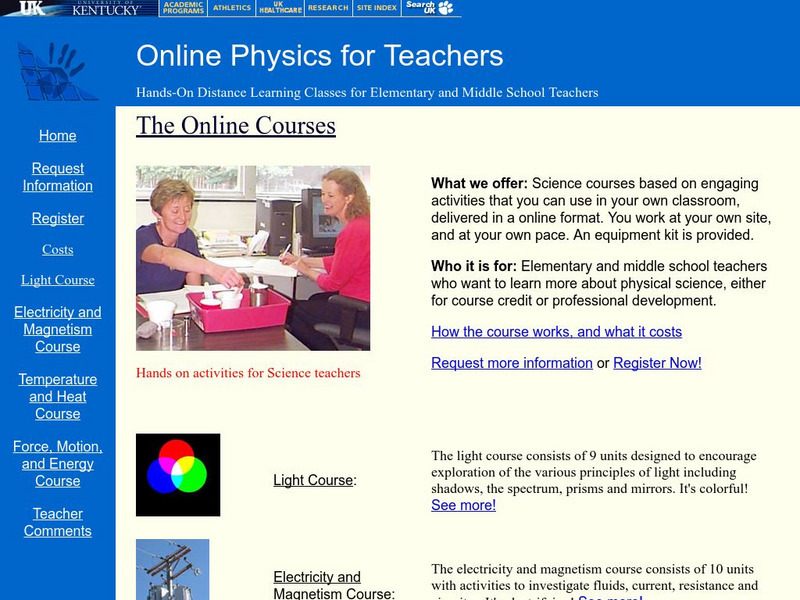Hi, what do you want to do?
Science Education Resource Center at Carleton College
Serc: Getting the Lightbulb to Light Up
Students construct a simple electrical circuit using wires, batteries, and a lightbulb. From constructing a circuit the students will discover that when energy is produced there is heat.
TeachEngineering
Teach Engineering: Do Different Colors Absorb Heat Better?
Students test whether the color of a material affects how much heat it absorbs. Students will place an ice cube in a box made of colored paper (one box per color; white, yellow, red and black), which they will place in the sun. The...
NASA
Nasa: From Stargazers to Starships: Energy
Demonstrates how principles of kinetic energy, potential energy and energy conservation can be used to determine the speed of a descending object if given its initial height. Further discussion of other topics such as heat and...
TeachEngineering
Teach Engineering: Light vs. Heat Bulbs
Students measure the light output and temperature (as a measure of heat output) for three types of light bulbs to identify why some light bulbs are more efficient (more light with less energy) than others.
Other
Ask Numbers: Measurement Conversion Calculators and Charts
What kind of unit conversion would you like to do? This site will allow you to do a multitude of conversions. Just click on the specific measurement you are needing to convert. It also provides a history of measurements and a chart of...
Alabama Learning Exchange
Alex: Save a Buck Challenge
Our pipes leak, air drafts push through our windows and walls, light bulbs create more heat than light, and every appliance we have stays plugged in all day long. Of course its our parents who pay the bills, so it doesn't matter. This is...
Nobel Media AB
The Nobel Prize: The Nobel Prize in Physics 1918: Max Planck
Use this site to learn about the scientific work of physicist, Max Planck (1858-1947 CE), whose studies in radiation and light earned him the 1918 Nobel Prize in Physics. Read his Nobel Lecture, "The genesis and present state of...
McREL International
Mc Rel: Whelmer #42 Learning Activity: Fire Sandwich
An easy to do activity if you have a Bunsen burner. The activity investigates combustion and heat conductivity. The activity is in lesson plan format that meets NSES standards.
TryEngineering
Try Engineering: Solar Structures
During this lesson, students will construct a passive solar house from everyday items then explore how the sun's energy is used to heat and cool it.
Museum of Science
The Atoms Family
Let this classic family of monsters guide you as you learn about energy. Interactive exercises, experiments, and demonstrations help to build knowledge and raise questions.
TeachEngineering
Teach Engineering: Let the Sun Shine!
Learners learn how the sun can be used for energy. They learn about passive solar heating, lighting and cooking, and active solar engineering technologies (such as photovoltaic arrays and concentrating mirrors) that generate electricity....
TryEngineering
Try Engineering: Here Comes the Sun
Students work in teams to learn about solar panel design, simple circuits, and how solar energy is used to provide power to simple machines such as calculators.
Scholastic
Scholastic Instructor: Sun Sational Science
Discover more about the sun when you visit this educational resource. The content of this site includes solar fun facts, experiments, and activities.
Science Buddies
Science Buddies: Radiant Radish Seeds
We all know that plants need sunlight and water to grow big and tall. But did you know that inside seeds are baby plants, and that the fragile baby plant inside the seed needs to be protected? If you've ever had a sunburn, you also know...
BioEd Online
Bio Ed Online: Finding the Carbon in Sugar
Students learn that fossil fuels release energy when they are burned, and this takes the forms of light, heat, gases, etc. In this lesson they explore combustion with a candle and with sugar. The lesson and accompanying PowerPoint can...
University of Kentucky
University of Kentucky: Online Physics for Teachers
A set of four online courses in Physics for elementary and middle school teachers. Each course targets a different topic area - light, electricity & magnetism, temperature & heat, and force, motion, & energy.
National High Magnetic Field Laboratory
Magnet Academy: Fluorescent Lamp 1934
Compared to incandescent lamps, fluorescent lamps last longer, require less energy and produce less heat, advantages resulting from the different way in which they generate light.
CK-12 Foundation
Ck 12: Physical Science for Middle School
This digital textbook covers core physical science concepts and includes interactive features, real world examples, and videos.





